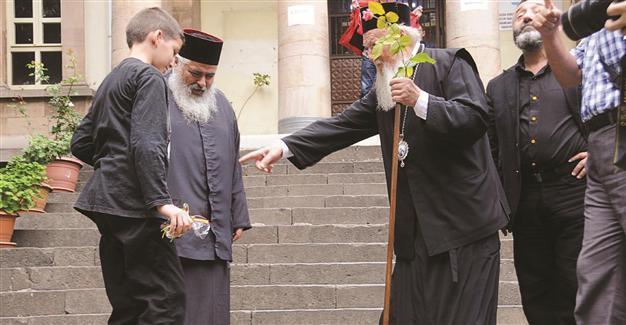Christian students to get their own religion classes, Turkey’s education minister says
ISTANBUL

Greek Orthodox Patriarch Bartholomew points during a visit to a vocational high school in the Black Sea province of Giresun.
Christian students in Turkey will get religion classes tailored to their own needs, Education Minister Nabi Avcı has said, adding that classes are also being considered for Jewish students.“I signed [the decision] today. There will be Christianity religion courses for Christian students. We have minority schools, and students who attend these schools will be able to learn their own religion if they demand it,” Avcı said in an interview with daily Habertürk on Oct. 9.
“Our Jewish citizens are working on [a project] to enable the introduction of religion classes in their schools,” he also said.
Turkish students, except those who attend the minority schools, are obliged to attend religion classes unless they specifically tell their school that they follow a religion other than Islam.
On Sept. 16, the European Court of Human Rights (ECHR) ruled that the Turkish education system is “still inadequately equipped to ensure respect for parents’ convictions” and therefore violates the “right to education,” in a case that stemmed from Alevi complaints about mandatory religious classes.
Turkish officials, however, have defended the compulsory religion classes, with Prime Minister Ahmet Davutoğlu saying “even an atheist should have religious knowledge” just one day after the ECHR ruling.
“It is necessary for an atheist to have knowledge of religious culture, just like I know about Marxism despite not being a Marxist,” Davutoğlu said on Sept. 17.
He also argued that the need for formal state religious knowledge is “essential” in Turkey, stressing that any misinterpretation of religion could lead to radicalization, as in neighboring countries. Davutoğlu also said it is “impossible to understand any social incidents in Turkey, the Middle East and the Balkans without considering the fact of religion.”
Meanwhile, in his Oct. 9 interview with Habertürk, Avcı also defended a recent government amendment that allows girls as young as 10 years old to wear the headscarf at schools.
“Allowing fifth graders to wear the headscarf is in fact a regulation that will increase girls’ schooling rate. Some families had chosen to send their children to [vocational Islamic] imam-hatip schools, or were having their girls attend distance education courses, in order to allow them to wear the headscarf. With the removal of the ban, many girls now prefer to attend normal schools rather than the distance education courses,” he said.
A government decree changing the regulation on the dress code in public schools was published Sept. 27 in the Official Gazette, allowing girls as young as 10 to attend classes wearing headscarves.
The amendment states that students “are to be present in schools with their faces visible; cannot use scarves, berets, hats, bags or similar materials that carry political symbols, pictures or writings; cannot dye their hair, cannot have tattoos or make-up; cannot have piercings; and cannot have a mustache or beard.”
Until now, only female students enrolled in imam-hatip schools were permitted to wear headscarves to class.
















